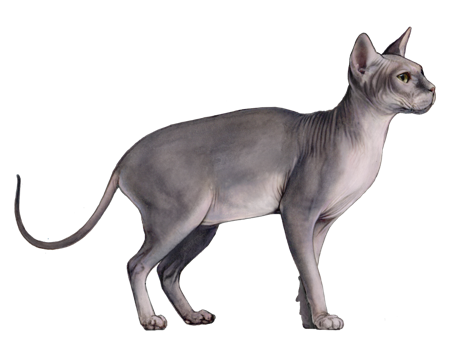
Munchkin
The first thing you'll likely notice about Munchkins is their short legs. But once you get to know these cats, their playful personalities and boundless energy are what leave a lasting impression.
Interested in discovering if your cat is a Munchkin?
Check out Wisdom Panel's DNA test.
Munchkin Traits
General Appearance
Small-to-medium-sized cats, Munchkins are most easily identified by their especially short legs.
Coat and Coloring
Munchkins have all-weather coats that come in both longhaired and shorthaired varieties. Longhaired Munchkins have semi-long, silky coats, whereas the shorthairs have medium-length, semi-plush coats. Both types come in a wide assortment of colors and patterns.
Distinctive Physical Traits
This breed's key traits include a wedge-shaped head with rounded contours, walnut-shaped eyes, a well-rounded chest, firmly developed muscles, and—of course—short legs.
Munchkin Temperament
Munchkins are playful, social cats that enjoy the company of other cats, dogs, and humans (including kids). They have a curious nature and like to explore their surroundings—often by sitting up on their haunches for a better view. Though they can't leap to high locations in a single bound, these lowriders use their intelligence and determination to get just about anywhere they want to go.
Built for racing, Munchkins love to chase after toys, run around the house, and take corners at impressive speeds. But when it's time to settle down, these affectionate cats are happy to curl up in a lap for a snooze.
Munchkin History
The Munchkin breed originated in 1983, though the gene mutation responsible for shortlegged cats dates back to 1930s England. A British veterinarian was the first to document four generations of cats with short legs. Reports of the mutation later appeared in Russia in the 1950s and New England in the 1970s.
The first Munchkin was a stray cat named Blackberry. Sandra Hockenedel found the pregnant shortlegged cat and took her in. When Blackberry had her litter, Sandra gave one of the kittens to a friend named Kay LaFrance. Sandra and Kay then used these two cats as the foundation for the Munchkin breed—outcrossing them with domestic cats to create diversity in the gene pool. Inspiration from the breed name came from The Wizard of Oz.
Research has found the gene that causes short legs to be dominant. That means a kitten needs to inherit a copy of the gene from just one parent to express the shortlegged trait. Studies also suggest that embryos carrying two copies of the mutated gene are often not viable and will not develop. For this reason, Munchkins must not be bred together—one parent should be a non-Munchkin breed.
TICA accepted the Munchkin into its new breed program in 1994 and granted it Championship status in 2003. But no other major cat fancy associations have followed suit. Questions about potential long-term health issues and controversy surrounding the ethics of perpetuating the gene mutation have kept other associations from recognizing the breed.
Munchkin Care
Nutrition
Munchkins need a high-quality diet formulated for their current life stage (e.g., kitten, adult, senior).
To keep your cat at a healthy weight, measure out meals and reduce portions if necessary. And don't forget to account for treats. As a guideline, they should make up no more than 10% of a cat's calories.
Finally, all cats need access to fresh, clean water around the clock.
Grooming
Munchkins' coats are relatively easy to maintain. Shorthaired cats need weekly brushing with a fine comb to remove loose fur. Longhaired cats require more frequent brushing—ideally up to three times per week—to prevent mats and tangles.
Most cats' nails require monthly trimming to prevent them from getting too long. Long nails are more likely to snag on something and become torn or damaged. They can even grow into your cat's paw pads, leading to pain or infection. In addition to clipping, providing a scratching post will allow your cat to do some nail maintenance themselves (thanks to their instinct to scratch).
No grooming routine is complete without a little dental hygiene. To support your Munchkin's overall health, brush their teeth daily and schedule visits with your veterinarian for professional dental cleanings and exams.
Health
Roughly one out of every three cats in the United States is overweight or obese. And those extra pounds can contribute to other health risks—such as arthritis, diabetes, and heart problems. Your veterinarian is the best resource for tips on managing your cat's weight.
Munchkin Genetic Health Conditions
-
Factor XII Deficiency (Variant 1)
Factor XII Deficiency, also known as Hageman trait, is an asymptomatic blood factor deficiency. While it does not cause an abnormal tendency to bleed, it can be observed as prolonged blood clotting times during certain laboratory screening tests.
-
Factor XII Deficiency (Variant 2)
Factor XII Deficiency, also known as Hageman trait, is an asymptomatic blood factor deficiency. While it does not cause an abnormal tendency to bleed, it can be observed as prolonged blood clotting times during certain laboratory screening tests.
-
Progressive Retinal Atrophy (Discovered in the Abyssinian)
Progressive Retinal Atrophy (Discovered in the Abyssinian) is a disorder that causes degeneration of the light sensing retina at the back of the eye, resulting in vision loss.
With more than 45 health tests, Wisdom Panel™ Complete for Cats screens for these and other important genetic conditions—allowing you to better plan for your cat's lifelong care.
Breed Group
Western
The largest of breed groups, the Western Group is mainly comprised of cats developed in Europe and the Americas. Due to the complexity of feline genetic diversity, however, cat breeds from other regions may also be found associated with this group.
Resources
https://tica.org/breeds/browse-all-breeds?view=article&id=857:munchkin-breed&catid=79
https://tica.org/phocadownload/mk.pdf
https://www.royalcanin.com/us/cats/breeds/breed-library/munchkin
https://www.banfield.com/state-of-pet-health/obesity
Reviewed February 23, 2021 by Annette Louviere, DVM
























